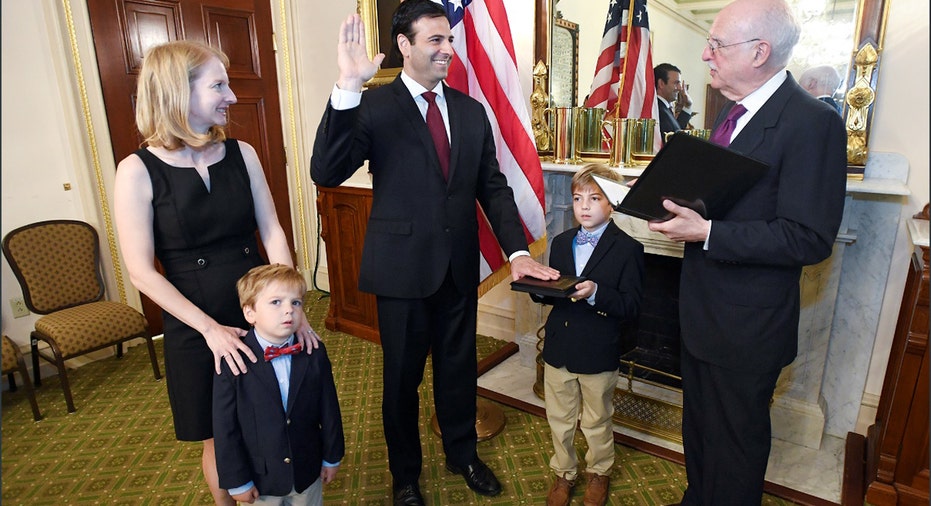Why the CFTC is the most important regulator you've never heard of

(Commodity Futures Trading Commission Chairman Heath P. Tarbert and his family)
Last week, I had the honor of becoming the new Chairman of the Commodity Futures Trading Commission. The CFTC regulates U.S. derivatives markets — including futures, the vast majority of swaps, and certain types of options. These markets see over $4 trillion in notional activity in the U.S. each day. Many Americans have probably never heard of the CFTC, but the sheer size and utility of these markets make it among our most important regulators.
Derivatives are critical for setting the prices of countless goods and services we depend on — from groceries to gasoline to home mortgage interest. In addition, American farmers, manufacturers, and a host of other businesses rely on these financial products to hedge their price risks. Today the CFTC and the derivatives markets are at a crossroads. More than a decade after the financial crisis, the agency is still working to implement Dodd-Frank, which established a framework for regulating swaps. But we must not allow our response to the last crisis to plant the seeds of the next, nor let it smother innovative technologies. Instead of taking the “ready, fire, aim” approach all too common in Washington, I am building the CFTC’s agenda with an open mind. In addition to combating fraud, abuse, and manipulation, I am thinking carefully about two sets of issues: resolving unfinished business and preparing for the unwritten future.
Unfinished Business
It may surprise many to learn that Dodd-Frank did not eliminate risk from derivatives markets. Far from it. Congress instead concentrated much of that risk into CFTC-regulated clearinghouses called central counterparties, or CCPs. Invoking Mark Twain, former Fed Chairman Ben Bernanke said about CCPs that “if you put all your eggs in one basket, you better watch that basket.”
This is why one of the most critical responsibilities of the CFTC is supervising CCPs on a daily basis. American CCPs are undoubtedly the strongest and most resilient in the world, and they need to stay that way. That is also why we are closely monitoring Brexit. Brexit will result in Europe’s largest financial hub leaving the EU with the likely consequence of European authorities losing jurisdiction over London-based CCPs. The EU recently passed legislation to retain that oversight. However, if misapplied, the law could direct foreign regulators to rewrite the rules for American CCPs. Despite the hyper-partisanship in Washington, there is virtual bipartisan unanimity that such an outcome would be a non-starter. Finally, the CFTC must issue long-awaited rules to limit derivatives positions that help unscrupulous traders corner commodity markets. The trick will be making sure these rules do not strip those markets of the flexibility needed to perform their fundamental risk-management functions.
The Unwritten Future
We must likewise be ready to tackle future opportunities and challenges. Technological innovations such as blockchain hold great promise, and the rise of digital “currencies” has created a new asset class. Working with our counterparts, the CFTC must develop a holistic framework for these 21st-century commodities. We must also keep a weather eye against emerging threats, especially cyber risks. Protecting against these risks, which includes protecting confidential trading data, is a top priority of the CFTC as well as the firms and exchanges we regulate.
How we regulate is just as important as what we regulate. Traditionally, the CFTC has had the distinction of being a principles-based regulator. This has allowed U.S. derivatives markets to evolve to meet the growing demands of our economy. At the same time, it has enabled the CFTC to respond to fast-moving crises and major market developments in a way overly proscriptive regulations would have prevented. Reinvigorating our historical principles-based approach, where appropriate, will help our markets remain fair, innovative, and vibrant.
CLICK HERE TO GET THE FOX BUSINESS APP
In leading the CFTC, I will not lose sight of the underlying purpose of our derivatives markets: to serve the needs of everyday Americans. These instruments touch all corners of the real economy — from farmers and ranchers who need to hedge grain and cattle prices, to manufacturers and exporters who need to manage exchange-rate fluctuations. In regulating these financial instruments, the CFTC serves as a guardian of our free-enterprise system.
Financial regulators are rarely applauded in the media, let alone discussed around the dinner table. Obscurity may dishearten some, but it is also a measure of the agency’s historical success.
Dr. Heath P. Tarbert is Chairman of the Commodity Futures Trading Commission. The views expressed above are solely Chairman Tarbert’s and do not necessarily reflect the views of the Commission or CFTC staff.